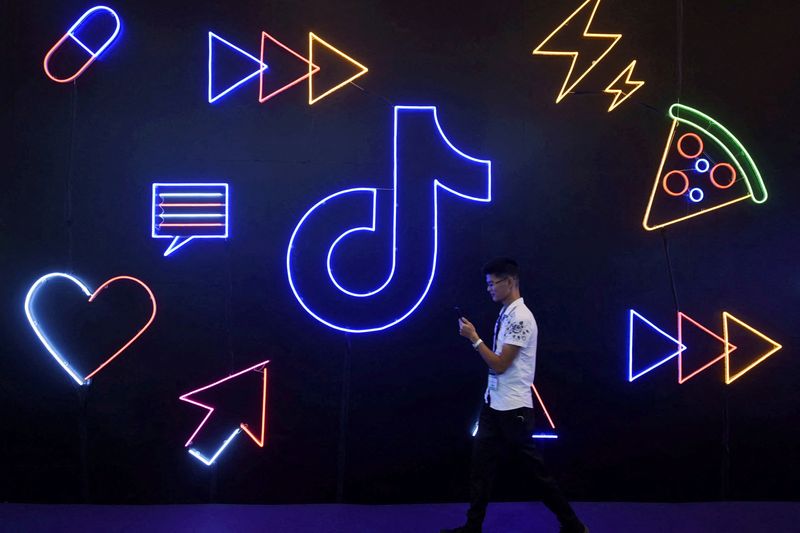By Andrew Chung and David Shepardson
WASHINGTON (Reuters) -TikTok made a last-ditch effort on Monday to stay active in the United States, asking the Supreme Court to temporarily block a law aimed at forcing ByteDance, its China-based parent company, to shut down the short-video app punch before January 19, otherwise you risk a ban.
TikTok and ByteDance filed an emergency petition with the justices for an order to halt a threatened ban on the social media app used by about 170 million Americans while they appeal a lower court’s ruling that enforced the law. A group of American users of the app also submitted a similar request on Monday.
Congress passed the law in April. The Justice Department has said that as a Chinese company, TikTok “poses a national security threat of enormous size and scope” due to its access to vast amounts of data on US users, from locations to private messages, and its ability to secretly manipulate content that Americans view on the app.
The U.S. Court of Appeals for the District of Columbia Circuit in Washington on December 6 rejected TikTok’s arguments that the law violates free speech protections under the First Amendment to the U.S. Constitution.
In their petition to the Supreme Court, TikTok and ByteDance said that “if Americans, duly informed of the alleged risks of ‘secret’ content manipulation, choose to continue watching content on TikTok with their eyes wide open, the First Amendment protects them mandates that choice, free from government censorship.”
“And if the D.C. Circuit’s opposing position holds, Congress will have a free hand to ban any American from speaking simply by recognizing the risk of the speech being influenced by a foreign entity,” they added.
The companies said a shutdown of TikTok for even a month would cause TikTok to lose about a third of its U.S. users and undermine its ability to attract advertisers and recruit content creators and staff talent.
Calling itself one of the “major voice platforms” used in the United States, TikTok has said there is no immediate threat to U.S. national security and that delaying enforcement of the law would allow the Supreme Court to review the legality of to assess the ban. and the incoming administration of newly elected President Donald Trump to also evaluate the law.
Trump, who unsuccessfully tried to ban TikTok during his first term in 2020, has reversed his position and promised during this year’s presidential race that he would try to save TikTok. Trump will take office on January 20, the day after the TikTok deadline according to law.
The law would “shut down one of America’s most popular speech platforms the day before a presidential inauguration,” the companies said in their filing. “A federal law that singles out and bans a speech platform used by half of Americans is extraordinary.”
When Trump was asked at a press conference on Monday what he would do to stop a ban on TikTok, he said he has “a warm place in my heart for TikTok” and that he would “take a look at it.”
Trump met with TikTok CEO Shou Zi Chew in Florida on Monday, a source familiar with the plans told Reuters on condition of anonymity. TikTok did not immediately respond to a request for comment on the meeting.
The companies have asked the Supreme Court to rule by January 6 on their request to allow, in the event it is rejected, the “complex task of shutting down TikTok” in the United States and to be allowed within the deadline with service providers. established under law.
The dispute comes amid rising trade tensions between China and the United States, the world’s two largest economies.
‘RIGOROUS RESEARCH’
TikTok has denied that it has or will ever share U.S. user data, accusing U.S. lawmakers of furthering speculative concerns.
TikTok spokesperson Michael Hughes said after the filing that “we are asking the court to do what it has traditionally done in free speech cases: apply the most rigorous scrutiny to the ban on speech and conclude that it violates the First Amendment .”
In its ruling, the DC Circuit wrote: “The First Amendment exists to protect freedom of speech in the United States. Here, the government acted solely to protect that freedom from a foreign enemy nation and to limit that adversary’s ability to collect data about people in the United States. United States.”

The law would ban certain services from being offered to TikTok and other apps controlled by foreign adversaries, including offering them through app stores such as Apple (NASDAQ:) and Alphabet’s Google (NASDAQ:), preventing their continued use in the U.S. is effectively prevented, unless ByteDance divests TikTok by the deadline.
A ban could open the door for a future U.S. crackdown on other foreign-owned apps. In 2020, Trump tried to ban WeChat, owned by Chinese company Tencent, but was blocked by the court.


